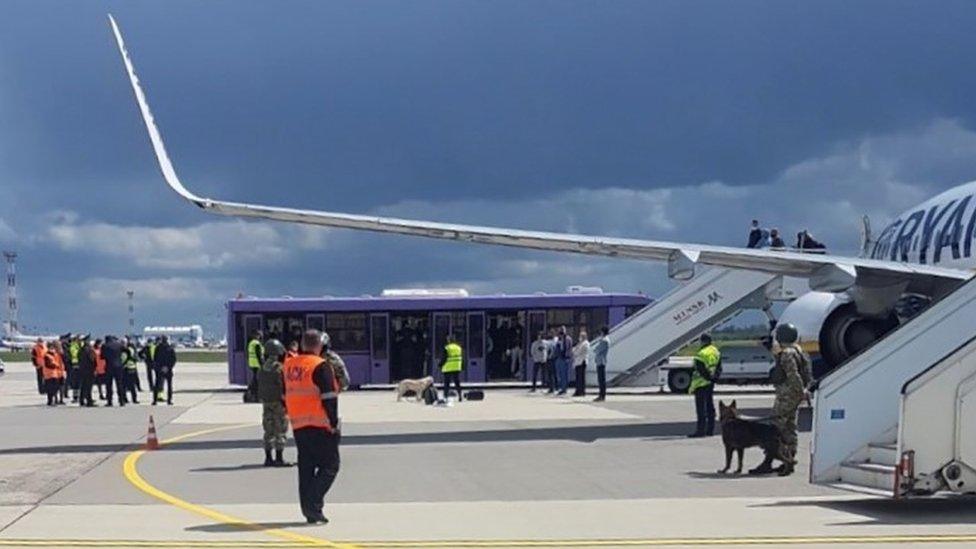Belarus: Hundreds join global solidarity protests
- Published
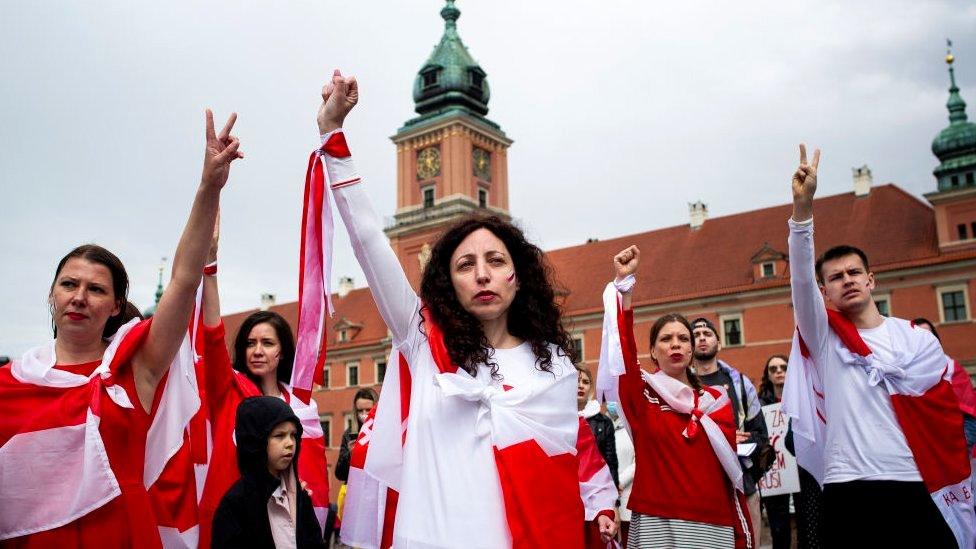
The crowd at the Warsaw demonstration waved the Belarusian opposition's red and white flag
Hundreds of people in Poland and Lithuania gathered for protests on Saturday to show support for the opposition in neighbouring Belarus.
They called for the release of a Belarusian dissident who was arrested along with his girlfriend when their flight was diverted to Minsk.
The pair's detention sparked global outrage, and prompted the EU to urge airlines to avoid Belarusian airspace.
Protests took place elsewhere in Europe as well as in the US and Australia.
Roman Protasevich, 26, and Sofia Sapega, 23, were flying from Greece to Lithuania on Sunday when a fighter jet was scrambled over Belarus to escort their plane to Minsk airport over a bomb threat which turned out to be fake.
They were arrested as soon as the Ryanair plane landed.
"I'm calling on all EU countries and the US to please help us free Roman and Sofia, as well as everyone else imprisoned," Mr Protasevich's mother, Natalia, said at a rally in the Polish capital Warsaw.
"We want to live in a free country, in a country where everyone has the right to express his beliefs," his father, Dmitry, added.
The crowd at the Warsaw rally waved the Belarusian opposition's red and white flag, and held signs that read Help Belarus and Freedom for Belarus.
"Things look really bad now. That's why we need to do something, show those fighting back home that they're not alone," Natallia Burak, a 35-year-old Belarusian living in the city, told the AFP news agency.
"As a Belarusian, we see a lot of wild and outrageous things," another demonstrator added.
"Right now it is genocide in Belarus"
Belarusian President Alexander Lukashenko, who has been in power for 27 years, has been nicknamed "Europe's last dictator". The 66-year-old has cracked down on dissenting voices, and many opposition figures have been arrested or fled into exile.
One such figure is the opposition leader Svetlana Tikhanovskaya, who spoke at a rally in Lithuania where she has been living in exile since last August.
"I believe that there will be changes very soon, there will be new elections, because there can be no other way," she told a crowd gathered in the capital, Vilnius. "Belarus will not give up."
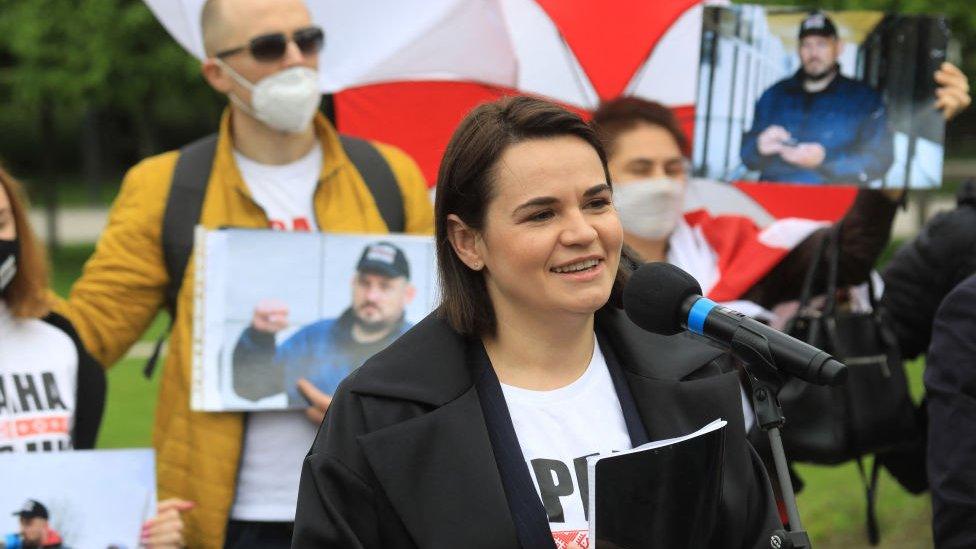
Svetlana Tikhanovskaya told a crowd in Lithuania that "Belarus will not give up"
Ms Tikhanovskaya and several hundred protesters marched to the Belarusian embassy in the city.
A similar demonstration also took place in Berlin, while smaller protests were seen in dozens of countries including Ukraine, Ireland, and the Netherlands.

Belarus: The basics
Where is Belarus? It has its ally Russia to the east and Ukraine to the south. To the north and west lie EU and Nato members Latvia, Lithuania and Poland.
Why does it matter? Like Ukraine, this nation of 9.5 million is caught in rivalry between the West and Russia. President Lukashenko has been nicknamed "Europe's last dictator" - he has been in power for 27 years.
What's going on there? There is a huge opposition movement demanding new, democratic leadership and economic reform. The opposition movement and Western governments say Mr Lukashenko rigged the 9 August election. Officially he won by a landslide. A huge police crackdown has curbed street protests and sent opposition leaders to prison or into exile.

What caused the latest crisis?
On Sunday, Ryanair Flight 4978 was travelling from Athens to Vilnius when it was forcibly diverted to Minsk.
Belarusian authorities said they had received a bomb threat - via Switzerland - but according to Swiss secure email provider Proton Mail the emailed message was sent after the plane was diverted, external.
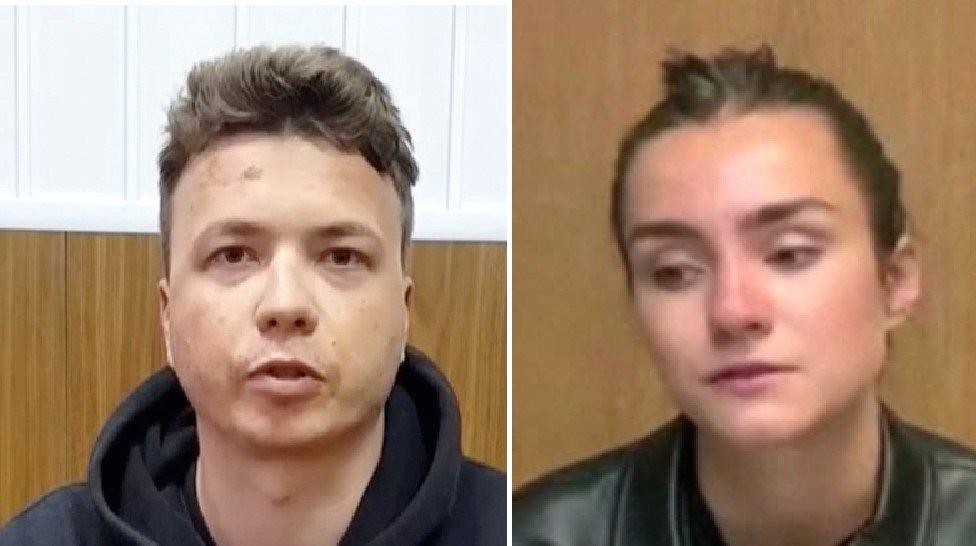
Opposition journalist Roman Protasevich and his girlfriend Sofia Sapega were detained when the plane's 126 passengers disembarked in Minsk
Aboard were Mr Protasevich and his girlfriend Ms Sapega, an international law student and Russian national. They were arrested shortly after the plane landed.
Mr Protasevich is a former editor of Nexta, a dissident media operation with a popular Telegram messenger channel. He left Belarus in 2019 and now lives in exile in Lithuania. Nexta became a significant channel for protesters challenging the August 2020 presidential election in Belarus, widely condemned as rigged.
Mr Protasevich, who was put on the Belarusian terrorist list last year, is accused of orchestrating the mass unrest last year and could be jailed for up to 15 years.
Russia's foreign ministry says Ms Sapega is accused of breaking Belarusian law last August and September.
Videos were released showing the pair confessing to crimes, but it is likely they were speaking under duress.
The UN's civil aviation agency has said it will launch a "fact-finding" investigation into Belarus's actions, asking whether there was any breach of international aviation law.
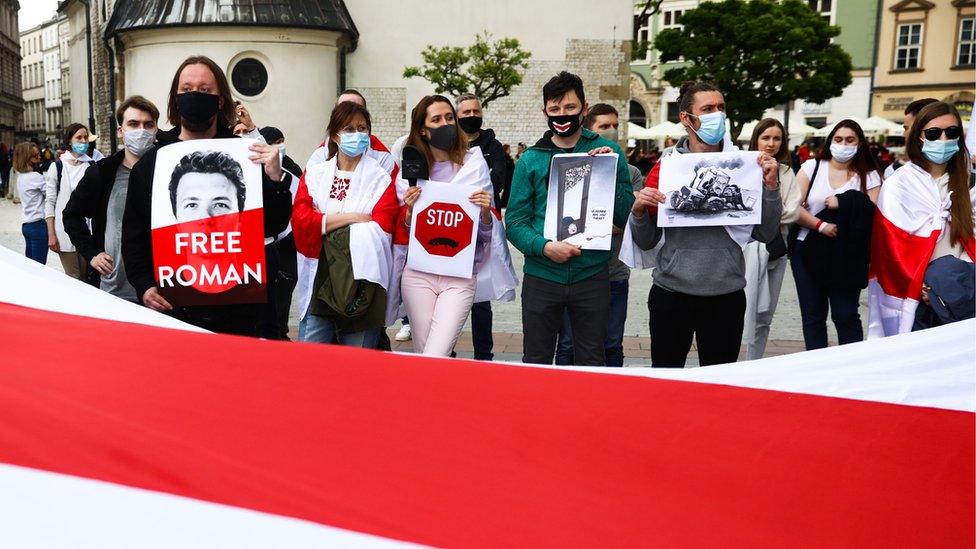
Crowds in Krakow, Poland, participate in a march in solidarity with Belarus
The US has also announced fresh sanctions against Belarus in response to the plane diversion.
On Friday, White House press secretary Jen Psaki said the incident was "a direct affront to international norms".
She said the US would re-impose sanctions against nine Belarusian state-owned enterprises, and would work with the EU and other allies to draw up a list of targeted sanctions against key members of the Lukashenko regime.
Franak Viacorka, a senior adviser to Ms Tikhanovskaya and a friend of Mr Protasevich, said sanctions were "the best and the most efficient tool" to help with the release of political prisoners.
"Of course it's not a silver bullet, it will not solve all the problems - it will not bring Belarus to democracy," he said. "But it will help to put enough pressure on the regime in order to force it to make concessions and to release people who are not guilty."
Meanwhile, talks in Russia between President Vladimir Putin and Mr Lukashenko continued for a second day on Saturday. Mr Putin later confirmed Russia would move ahead with a second $500m (£352m) loan to Belarus next month.
The full $1.5bn loan was initially agreed at a meeting in Sochi last September.
Russia is Mr Lukashenko's strongest political ally, even though personal relations between the two long-time presidents are at times said to be strained.
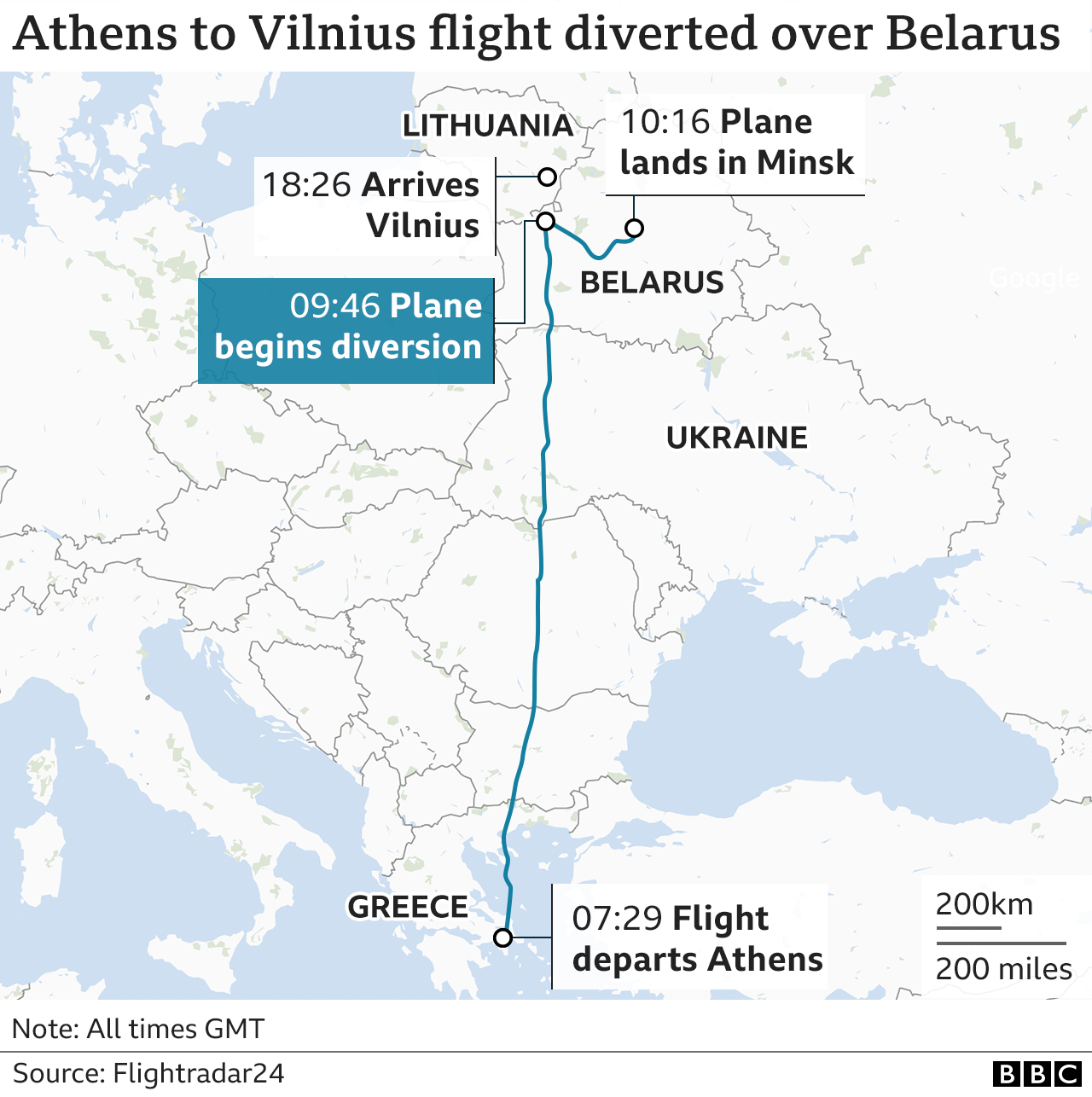

- Published28 May 2021
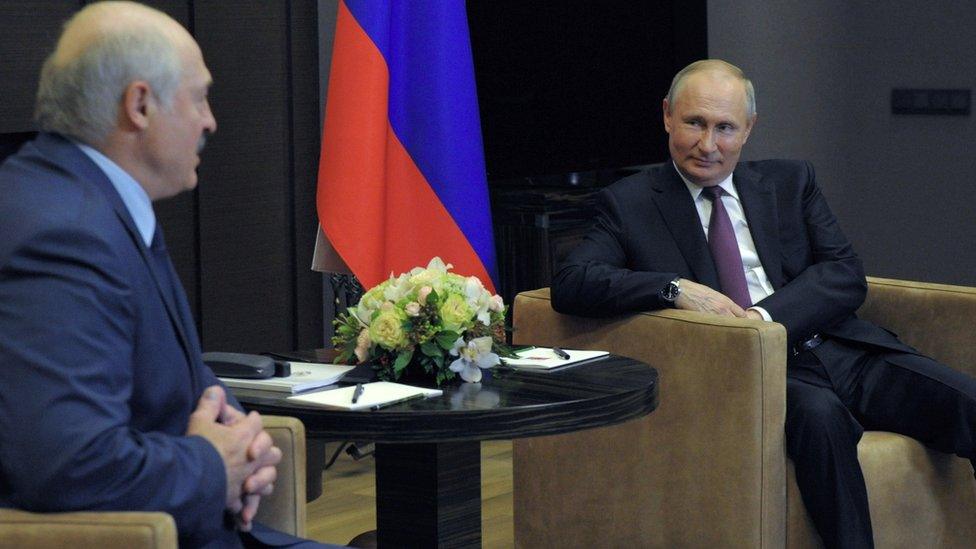
- Published27 May 2021
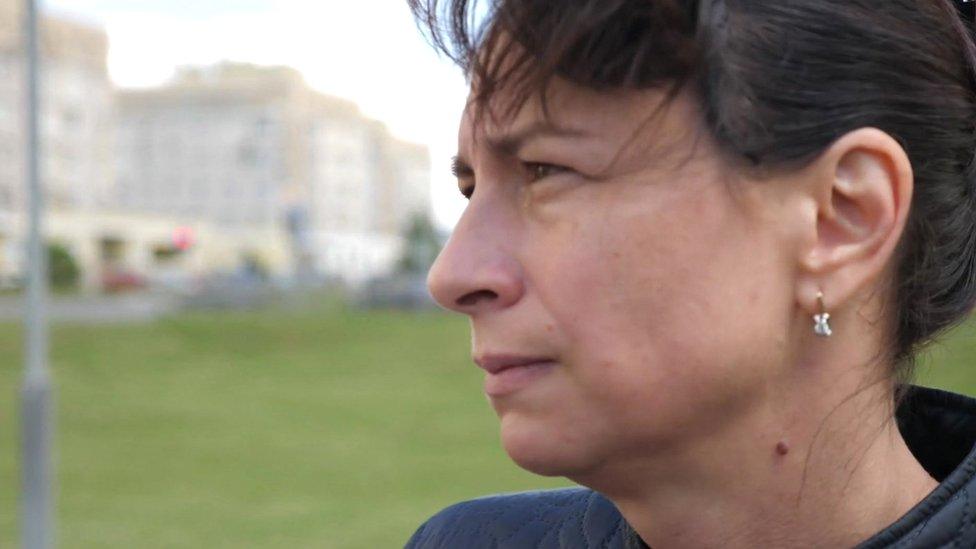
- Published26 May 2021
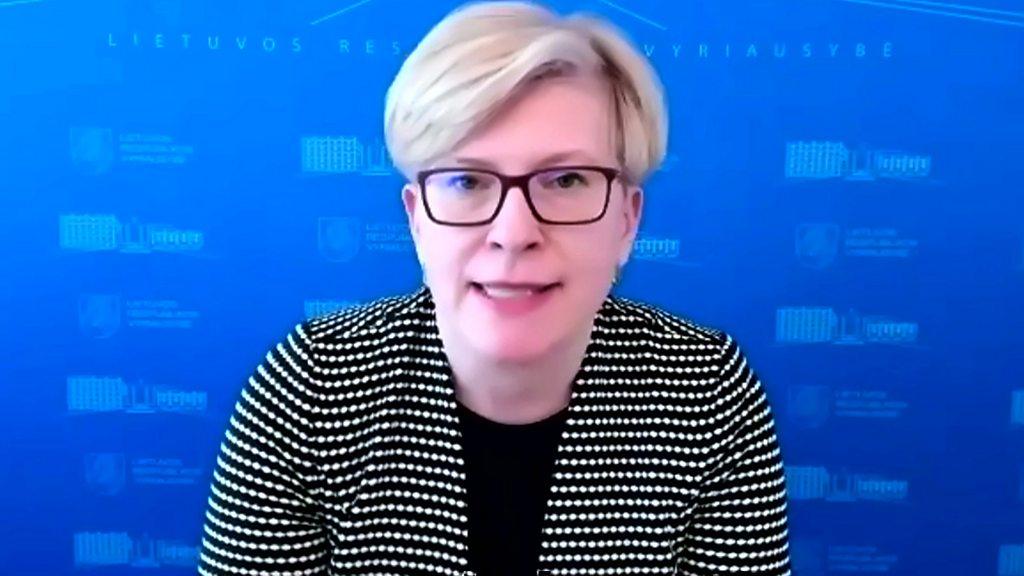
- Published25 May 2021
